 France (1893) – Casabianca, Cassini, D’Iberville
France (1893) – Casabianca, Cassini, D’IbervilleWW1 French Cruisers
Sfax | Tage | Amiral Cecille | D'Iberville class | Dunois class | Foudre | Davout | Suchet | Forbin class | Troude class | Alger class | Friant class | Linois class | Descartes class | D'Assas class | D’Entrecasteaux | Protet class | Guichen | Chateaurenault | Chateaurenault | D'Estrées class | Jurien de la Graviere | Lamotte-Picquet classDupuy de Lome | Amiral Charner class | Pothuau | Jeanne d'Arc | Gueydon class | Dupleix class | Gloire class | Gambetta class | Jules Michelet | Ernest Renan | Edgar Quinet class
The D’Iberville class in brief
The three ships of this class, Casabianca, Cassini and Iberville were put into service between 1894 and 1896. They came a few years after the two Lévrier 1891, but differed in all. Larger and nearly twice as heavy, they had a forecastle and raised poop, and a more consistent and better distributed artillery. The D’Iberville was the only one fitted with 6 Torpedo Tubes (TT), the other two having three, but in 1899, the first had them all disembarked, followed later by the others.
Operational career
The Casabianca and Cassini were rebuilt in 1911-12 as minelayers, but showed little brillance in this role and were replaced by Pluto and Cerberus in 1913. Nonetheless the fleet kept them in service in 1914, for patrols. Casabianca struck a mine off Smyrna in June 1915 and the Cassini was torpedoed by a U-boat in February 1917 in the Strait of Bonifacio. The D’Iberville was on duty in the harbor of Penang, witnessed the destruction of Jemtchug by Emden but believing it was an accident she left the German cruiser unscaved, the latter being largely superior in all directions anyway. She then patrolled the Algerian coast until late 1917 but was withdrawn from service in 1922.
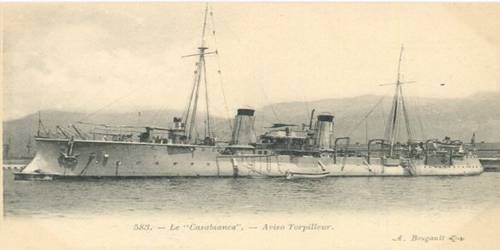
Casabianca in the 1900s. Shorter chimneys and masts, no TTs.
Links
List of French Torpedo Cruisers
French torpedo cruisers
Specs Conway’s all the world fighting ships 1860-1906.
D’Iberville class specifications |
|
| Dimensions | 95 x 12 x 5.4 m |
| Displacement | 2428 tonnes FL |
| Crew | 137 |
| Propulsion | 2 screws, 2 turbines, 8 Normand boilers, 8500 hp |
| Speed | 20.5 knots (40.7 km/h; 25.3 mph) |
| Armament | 2 x 140 mm, 4 x 100 mm, 8 x 47 mm QF, 2 x 12.7 mm MGs (1914) |
| Armor | None |
Gallery
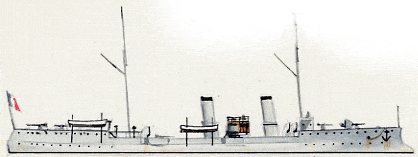
D’Iberville in the 1890s

Cassini in the 1900s. Notice the shorter masts and chimneys. TTs were removed by then.
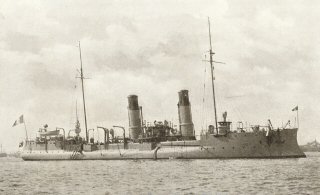
Torpedo Cruiser Cassini
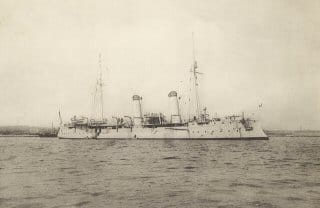
Cassini in the 1890s

 Latest Facebook Entry -
Latest Facebook Entry -  X(Tweeter) Naval Encyclopedia's deck archive
X(Tweeter) Naval Encyclopedia's deck archive Instagram (@navalencyc)
Instagram (@navalencyc)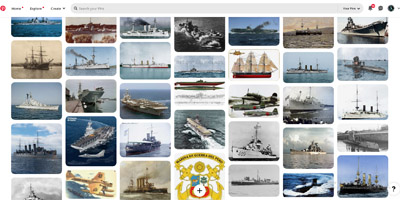

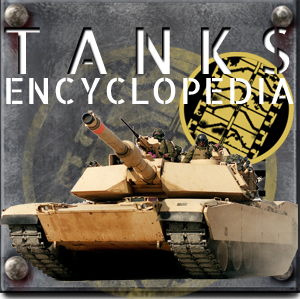
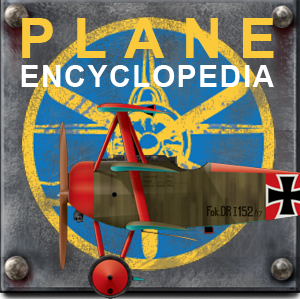
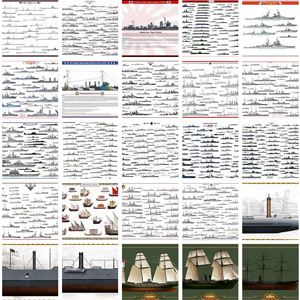
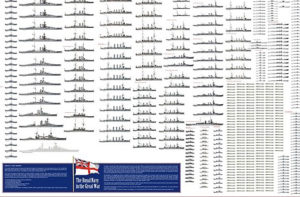
 French Navy
French Navy Royal Navy
Royal Navy Russian Navy
Russian Navy Armada Espanola
Armada Espanola Austrian Navy
Austrian Navy K.u.K. Kriegsmarine
K.u.K. Kriegsmarine Dansk Marine
Dansk Marine Nautiko Hellenon
Nautiko Hellenon Koninklije Marine 1870
Koninklije Marine 1870 Marinha do Brasil
Marinha do Brasil Osmanlı Donanması
Osmanlı Donanması Marina Do Peru
Marina Do Peru Marinha do Portugal
Marinha do Portugal Regia Marina 1870
Regia Marina 1870 Nihhon Kaigun 1870
Nihhon Kaigun 1870 Preußische Marine 1870
Preußische Marine 1870 Russkiy Flot 1870
Russkiy Flot 1870 Svenska marinen
Svenska marinen Søværnet
Søværnet Union Navy
Union Navy Confederate Navy
Confederate Navy Armada de Argentina
Armada de Argentina Imperial Chinese Navy
Imperial Chinese Navy Marinha do Portugal
Marinha do Portugal Mexico
Mexico Kaiserliche Marine
Kaiserliche Marine 1898 US Navy
1898 US Navy Sovietskiy Flot
Sovietskiy Flot Royal Canadian Navy
Royal Canadian Navy Royal Australian Navy
Royal Australian Navy RNZN Fleet
RNZN Fleet Chinese Navy 1937
Chinese Navy 1937 Kriegsmarine
Kriegsmarine Chilean Navy
Chilean Navy Danish Navy
Danish Navy Finnish Navy
Finnish Navy Hellenic Navy
Hellenic Navy Polish Navy
Polish Navy Romanian Navy
Romanian Navy Turkish Navy
Turkish Navy Royal Yugoslav Navy
Royal Yugoslav Navy Royal Thai Navy
Royal Thai Navy Minor Navies
Minor Navies Albania
Albania Austria
Austria Belgium
Belgium Columbia
Columbia Costa Rica
Costa Rica Cuba
Cuba Czechoslovakia
Czechoslovakia Dominican Republic
Dominican Republic Haiti
Haiti Hungary
Hungary Honduras
Honduras Estonia
Estonia Iceland
Iceland Eire
Eire Equador
Equador Iran
Iran Iraq
Iraq Latvia
Latvia Liberia
Liberia Lithuania
Lithuania Mandchukuo
Mandchukuo Morocco
Morocco Nicaragua
Nicaragua Persia
Persia San Salvador
San Salvador Sarawak
Sarawak Uruguay
Uruguay Venezuela
Venezuela Zanzibar
Zanzibar Warsaw Pact Navies
Warsaw Pact Navies Bulgaria
Bulgaria Hungary
Hungary

 Bundesmarine
Bundesmarine Dutch Navy
Dutch Navy Hellenic Navy
Hellenic Navy Marina Militare
Marina Militare Yugoslav Navy
Yugoslav Navy Chinese Navy
Chinese Navy Indian Navy
Indian Navy Indonesian Navy
Indonesian Navy JMSDF
JMSDF North Korean Navy
North Korean Navy Pakistani Navy
Pakistani Navy Philippines Navy
Philippines Navy ROKN
ROKN Rep. of Singapore Navy
Rep. of Singapore Navy Taiwanese Navy
Taiwanese Navy IDF Navy
IDF Navy Saudi Navy
Saudi Navy Royal New Zealand Navy
Royal New Zealand Navy Egyptian Navy
Egyptian Navy South African Navy
South African Navy






























 Ukrainian Navy
Ukrainian Navy dbodesign
dbodesign